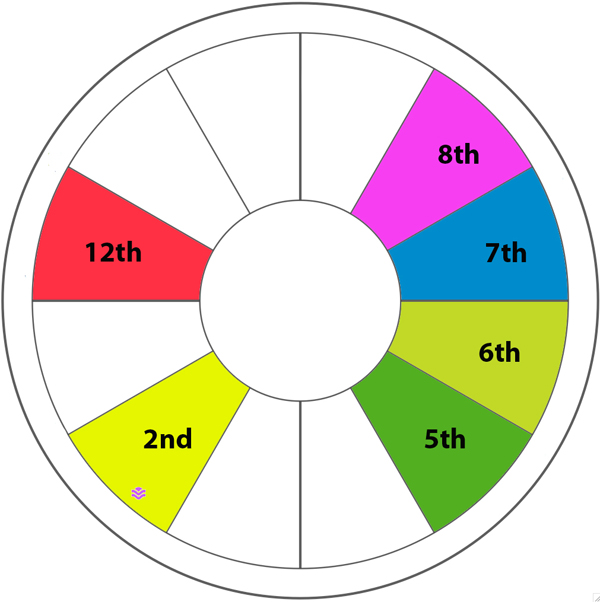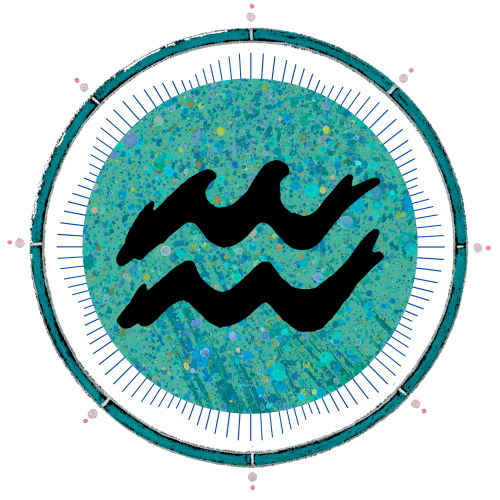
What does astrology tell us about sex and sexuality? Astrology is organized by house — the ‘department of life’ where events occur.
The colored houses in the wheel are the ones that address sexuality directly. That would be about half the houses. For those new to the astrological system, a house is a basic division of the chart. The houses started with the signs, then became a wheel imposed on top of the signs; so that the two wheels make a unique pattern in each chart, and most houses comprise of part of at least two signs.
That aside, the houses have a certain philosophy that accompanies them; how do we divide up the subject matter of life? How do we think of the meaning of each house?
Part of the answer involves how far back the astrologer’s understanding of the houses goes. There are traditions involved in assigning subject matter to houses. In this article, I am assembling everything that I’ve learned both from reading and from working with many, many clients on actual questions. Here is a prior summary of the houses, not designed to answer the question of which houses address sexual subject matter. That page needs an update; the page you’re reading may be it.
It would be easy to find meaningful sexual themes in all the other houses, not colored in. Let’s start with them: the “non-sexual houses.”
I have left out the 1st house. The 1st is a crucial house of sexuality because it’s about identity — we all identify with our sex, our gender and our sexual identity group. Remember Hannah, the Book of Blue model who said, “It’s not about sex, it’s about self“? Wisdom from the mouth of a babe.
Sex and self are closely related. When you say, ‘I am a lesbian’ or ‘I am monogamous’, that is core 1st house material: how you experience yourself, describe yourself and the face you put on. One could write a whole book chapter called ‘Sexual Identity and the 1st House of Astrology’, and people would even read it. The 1st represents the self that does the sexing; the identity that is attractive to others or not; the presence in the world that exists and is noticed or alternately feels invisible and ignored.
We could include the 3rd house because so much of sex and relating involves language and ideas, from talking dirty to love notes to pillow books. Here in the BlackBerry Age, the 3rd is all those communication devices that have become sex toys, from video cameras to the digital keyboard we send those hot, pervy notes with. The 3rd is also the neighbors we flirt with; the roommate (or sibling) we play with. We could include the 4th house because one’s whole sexual reality is balanced on one’s level of security and grounding. So the business of the 4th house is strongly influential in one’s relational and sexual reality.
The 9th house isn’t about sex but it’s about either: religion, which impresses its sexual values onto people like nobody’s business (and for many, co-opts the whole issue); or spirituality/higher self, which is about sex because we have the theme of full integration of the psyche and the honoring of sexuality as a sacred ritual. In the Thema Mundi (the ancient chart of the world — a key teaching example from Hermetic astrology), Pisces is in the 9th house. Pisces is the cosmic source, the most watery water sign, the sign that embraces all, contains every trace element, swallows all differentiation, and provides a great deal in the way of direct knowledge and nourishment: and much that seems like mist and taken for granted rainwater. Pisces to human consciousness represents the headwaters of creation; the mouth of the river of creation; the River of Night and the ocean on which creation floats, and into which it will someday dissolve. That sounds like it could include sex.
The 10th house is the power house, and we all know that the more power and visibility you have, the more people are interested in you. So the 10th is full of sexual dynamics and if an astrologer is doing the chart of a successful or planning-to-be-successful person well, a check-over of those dynamics is vital.
The 11th house is about social groups: who we meet and where we meet them. The 11th would cover themes such as polyamory, because it’s a group activity in many different ways (poly people tend to create group environments in which to get together, their relationships are group environments, and they have different norms within their social groups — an 11th house theme).
But let’s skip that kind of house where a sexuality is implied or exists by extension, and initially cover the houses that specifically address material of a sexual or erotic nature, starting with the 2nd house and going in order.
The 2nd house addresses masturbation, as the house of self-value and self-relating. It is the resources we have that come from ourselves. You might call it the sexual/erotic/amorous bank account. It is the house of “you can only love others as much as you love yourself” and by extension, “your sexual relationship to yourself is the basis of your sexual relationship to others.” Contrast this with the 8th house in a little while. When you apply the Thema Mundi(the ancient chart of the world) this house is associated with Leo and the Sun, which act like a giant battery of resources that we access if we know where to start.
The 5th house is the house of play, pleasure, child-like fun, curiosity and risks. The 5th includes art and artists, and we know that these are among the most sexually interested and interesting creatures; we know how much art involves sexual, erotic or relational themes. For many astrologers, this is THE house of sex; just consider the themes. The ‘child like fun’ also includes children and the activities which lead to their existence. If you apply the Thema Mundi, you find out that this is the house that has Scorpio involved, which is the sign of the genitals, of sexual bonding and of deep surrender. So the superficial appeal of the 5th — fun, risks and pleasure — lead deeper, into the more emotional, karmic region of Scorpio. Isabel Hickey called the 5th the house of esoteric karma. She does not say what she means (and it sounds like she got this from a writer named Alice Bailey, but I cannot find it), but if you study the 5th, that is, if you watch what happens with 5th house events, placements and transits, you figure it out. There is that “other layer” that became evident when Project Hindsight unearthed the Thema Mundi.
The 6th house is the house of healing, service and wellbeing: bienestar. Most astrologers would not say this is a house of sexual or relational themes, unless they have a holistic orientation. First, a healthy sexuality and sex life are key elements in whether one is mentally and physically healthy. Looked at another way, much of the world is walking around with unaddressed sexual injury. Consequently, all healers (6th house role) are working with their clients on those injuries whether they know it or not. All healers, be they massage therapists, astrologers, psychologists or doctors, have to work out a system of sexual boundaries with their clientele and the 6th is the environment in which this is done. Then there are those who work specifically as sexual healers; there are more than you think. Some are working ‘undercover’ as nurses who lock the door and help out someone laying in traction; others are working as erotic massage practitioners. These are people offering sex in service. Anyone who is a conscious lover offers sex in service, and as a gesture of healing and self-integration (again, whether ‘consciously’ or not). The 6th is also the house that covers one’s workplace, and we all know how much sexual energy flies around the office; how many affairs; how many relationships start in the office.
The 7th house is the one that covers lovers and open enemies (the ancients either had a sinister sense of humor or were highly perceptive, or both). The 7th is where we engage with The Other directly, be it lover, spouse, boyfriend, girlfriend or mistress. The 7th speaks of the inherently polarized nature of relationships, and of sexual relationships in particular. It’s interesting that the 7th covers open enemies: how many of those does sex make?
The 8th house in the words of my astrology mentor David Arner is the sex you want. It’s also the sex you want specifically from others, so carries themes such as jealousy and possessiveness. From the earliest English characterization, it’s the house of death, dowry and the substance of the bride. In more modern terms it’s the house of other people’s resources, which would count for their sex, sexual organs, reproductive capacity, genetic material, genetic lineage/heritage and all matters of legacy that connect with sex (such as your father in law). The sexual psychology of the 8th is the fascinating stuff we usually glaze over. The 8th contains our concept of surrender; what prompts, or induces, or leads, or pushes us into surrender. We tend to keep this secret. It would be interesting to peer into your mind in those last 10 seconds before orgasm and see what, ultimately, allows you to let go. I think that is the 8th house at its most beautiful psychic depth. In some respects the 8th is the power game we play with ourselves (by granting or denying that thing that helps us let go); and at other times it is the leverage we use against others to concentrate power, or try to; but of course there is that point of frustration — dualism. Nothing that we do to others, are we free from. The 8th is also the house that covers specifically where money is exchanged for sex, so all matters of prostitution would be covered by the 8th, even if they have other themes covered by other houses.
The 12th house in Vedic astrology is the pleasures of the bed. In Western astrology it represents the fantasy life and has a close correspondence to both solo sex and partner sex, which can be equally driven by fantasy. It often represents the disowned material which we project onto others. See all those houses on the right side of the chart? They are called the zone of projection (a term that came to me through the Canadian astrologer Ani Black). Most of the houses of relationship and sexuality are covered in the zone of projection and the 12th is like this hidden projection booth from where the light shines. Once we call back the projection and enter the 12th consciously, all the rules change; indeed, they are all suspended, and we are free within the containment of our own minds. Yet if those minds reach out to one another, the 12th may be the most significant meeting place; call it the astral plane, call it the collective unconscious; call it what you will. It is the house where we are all equal before the power of creation.
Any questions?



